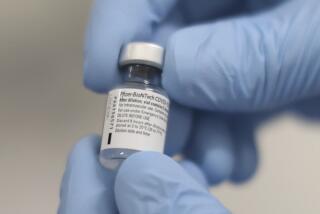UCSD to Study Tie Between Hormones, Heart Disease
- Share via
SAN DIEGO — UC San Diego School of Medicine is taking part in a national study to determine if commonly used postmenopausal hormone therapies can reduce a woman’s risk of heart disease.
The program could have “a significant impact on the health care of millions of women,” Dr. Robert Langer, director of the UCSD study, said. About 250,000 women die each year of heart disease, which Langer said is the leading cause of death in women older than 50.
The three-year Postmenopausal Estrogen/Progestin Interventions trial, funded by the National Institutes of Health, will involve about 840 postmenopausal women ages 45 to 64.
In addition to UCSD, trials will be conducted at UCLA, Stanford University, Johns Hopkins University in Baltimore, the University of Texas, the University of Iowa and George Washington University in Washington.
Each of the seven participating clinics will enroll about 120 participants, according to Dr. Bradley Wells, a professor at the Bowman Gray School of Medicine at Wake Forest University in Winston-Salem, N.C., which will coordinate the study results.
The trial will use television commercials featuring cast members of the NBC sitcom “Golden Girls” to attract participants, according to Dr. Elizabeth Barrett-Connor, a UCSD professor who served as chairwoman of the committee that designed the study.
The study is expected to address “many unanswered questions” about estrogen-replacement therapies that many postmenopausal women regularly receive, Barrett-Connor said Friday. Although researchers suspect that some replacement hormones reduce the likelihood of developing heart disease, studies also have indicated that “therapy carries risks as well as benefits,” Barrett-Connor said.
Menopause occurs when menstrual periods end and the ovaries stop producing estrogen and progesterone, hormones that regulate the menstrual cycle and fertility.
About 85% of postmenopausal women experience symptoms related to hormonal changes. Many women suffer hot flashes, a condition that, although uncomfortable, is generally not considered to be life-threatening.
But, for a significant number of women, the hormonal changes cause serious medical conditions, including thinning of vaginal and bladder tissues and osteoporosis, the thinning of bones.
While both men and women suffer from osteoporosis, the condition is accelerated by menopause. Menopause also increases the risk of heart attack among women in their mid-60s.
Consequently, as many as 30% of women experiencing menopause are believed to be receiving some sort of hormone-replacement therapy.
Women who participate in the trial will receive a placebo or one of four different replacement hormones that are believed to reduce the risk of heart disease. The trial also will study suspected links between those replacement hormones and a wide range of medical conditions, including osteoporosis, diabetes and breast cancer.
The study will “test the effects of various hormone combinations on cholesterol and other blood factors and will help us define the best hormone combination for postmenopausal women,” Langer said.
During the three-year trial, participants will receive free medical examinations, including mammograms, Pap tests, periodic blood-pressure tests, electrocardiograms and cholesterol and blood sugar measurements. UCSD researchers also will use a special machine to measure bone density.
UCSD is seeking healthy volunteers from the ages of 45 to 64 who underwent a natural or surgical menopause within the past 10 years. In addition to taking hormones, participants will undergo 14 checkups at the university’s Clinical Research Center in La Jolla during the three-year period.
Early results from the clinical trials will not be available until at least 1994, Wells said. The first participants “will be enrolled around Dec. 1, and recruitment will continue for at least a year after that,” Wells said. “The last participants won’t be enrolled until the end of January 1991.”
Women interested in taking part in the study are asked to contact the Clinical Research Laboratory at 619-534-7150.






